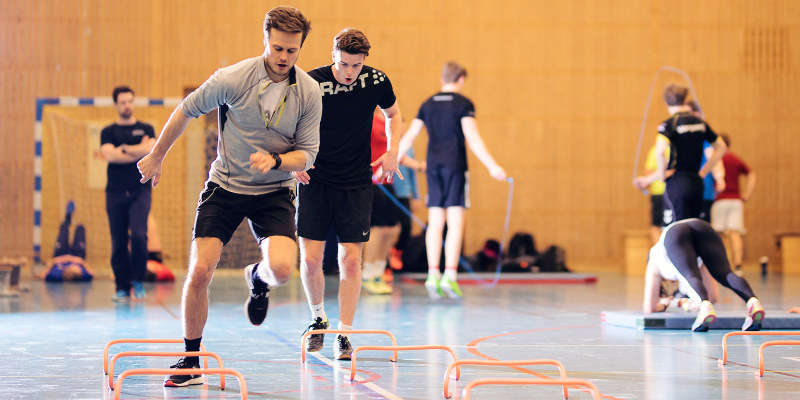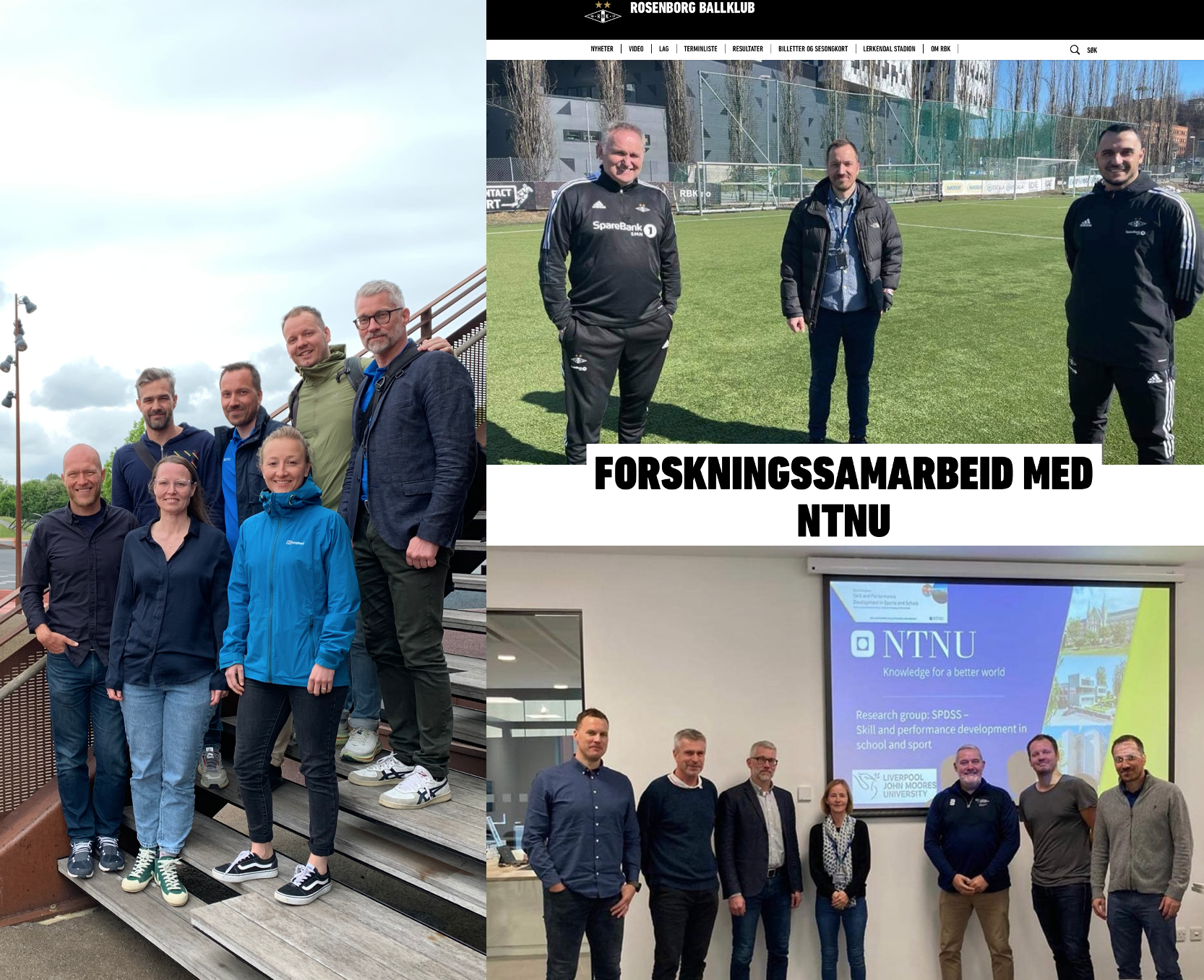Skill and performance development in sports and school – Research – Department of Sociology and Political Science
Skill and Performance Development in Sports and School (SPDSS)

About us
Both the sports and school context are characterized by the relationship between skill development and performance, where athletes and students learn and develop skills related to sports and physical activity respectively. The coach and the teacher are important contributors to ensuring the athletes development, but also the environments that the athletes/students and coaches/teachers are part of have a crucial role for their development. In this context, it is worth mentioning that for some, sports and school are closely intertwined through i.e. sport specialisation programs (SSPs) and elite sport specialisation programs (ESSPs) in upper secondary schools.
Athletes/students are themselves the most important contributors to their own development and performance. Important questions are therefore what characterizes their development and how parents, friends, coaches and teachers contribute to this development. In order to develop skills, athletes/students are dependent on knowing what’s expected from, what skills they should develop and which stage of development they are in. To what extent these requirements are clearly communicated to athletes/students (do they know?) can be discussed.
Research Topics
Our research group works extensively with this themes in both the sports and school context, with 4 main thematic pillars:
Pillar 1: Talent Development & Elite Sport
Pillar 1: Talent Development & Elite Sport
Pillar 1 deals with research on talent development and elite sport with a focus on both individual development, team development, and development of development environments. The research focuses on factors and themes around athlete development, individually and collectively, from an individual and environmental perspective, as well as the influence of coaches and managers/leaders on development environments from both an environmental and a system perspective. Developing athletes to the elite level requires a lot in many different phases and steps in the athletes' development and even more if the athletes were to reach the elite level. Examples of research topics within this pillar are; coach development (system), talent development environment (environment), career and development transitions (environment), perfectionism (individual), stress (individual), dual career (individual/environment), the coach's role (individual/environment) and talent transfer (system).
Pillar 2: Performance Environments
Pillar 2: Performance Environments
Pillar 2 deals with research on performance environments in sports, schools and other contexts where individuals seek to develop skills and perform under pressure. The research is based on the fact that the quality of the environment is of crucial importance for both short-term performance and long-term development. The focus is on how social, structural and psychological factors influence motivation, learning and performance development. Central to the understanding of such environments are modern motivational theories that emphasize the interaction between environment and cognitive processes in the individual's learning and performance. Performance environments can be found in a wide range of contexts - from mandatory participation in physical education, via competition at various levels in voluntary sports, to professional refereeing and high-risk activities in extreme sports. Examples of research topics within this pillar are; school performance and assessment methods in physical education, decision-making and stress management among referees, motivation for risk-taking in climbing, as well as participation and dropout in children and youth sports. The goal is to understand how performance, learning and motivation are shaped and maintained in different performance environments.
Pillar 3: Groups Dynamics and leadership
Pillar 3: Groups Dynamics and leadership
In Pillar 3, the focus is on group dynamics and leadership, and the research is linked to developing knowledge about how the coach's leadership can facilitate optimal development in athletes and sports teams. We are particularly interested in investigating different leadership styles and leadership behaviors (identity leadership, transformational leadership, and destructive coaching behavior) and how they affect athletes and group dynamic factors such as cohesion, team trust, mastery beliefs, coping strategies, intrateam communication, and team coordination. In several of the research projects, we examine elite sports teams where we look at the interaction between coach, athlete, and group. Through educational, sociological, and social psychological theories, we seek to promote deeper insight into the psychological and social aspects of high-performing sports teams and the coaching processes.
Pillar 4: Risk culture
Pillar 4: Risk culture
To achieve success, an athlete depends on a well-functioning body and health. Athletes therefore invest thousands of hours in training, rest and nutrition to optimize their own bodies for development and success in competitions. In contrast to this optimization of the body, there is a widespread belief in sports that athletes should push their bodies to the limit and accept the risk of pain, injuries and burnout ("sacrifice everything"). Ignoring and trivializing pain, injuries and being mentally tired is therefore a central part of sports participation, also in the Scandinavian sports model. Sport is a context that normalizes and sometimes glorifies such risk, hence the term "risk culture". In this pillar, we aim to develop a better understanding and competence about sport as a risk culture, with a special focus on athlete well-being and healthy development environments. Examples of research topics within this pillar are; attitudes towards training and competing with pain and/or when mentally tired, attitudes towards communicating pain and/or that one is mentally tired to one's coaches (and teammates), attitudes towards the use of painkillers in connection with one's sports participation, experience of being injured, etc.
Projects
- Development Environment and Destructive Leadership in Sports
- Female athletes - a different talent development process?
- Power, politics, and performance: Examining the gendered processes and outcomes of a merger between a men’s and women’s Norwegian football club
- A qualitative examination of talent development environments in international youth football – England, Denmark and Norway
Ph.D. Projects
- Mental health, physical education and PE as an academic break
- Talent Development Environments in Women's Ice Hockey
Former projects
Selected publications
- Sæther, S.A., Banne, H. Larsen, C.H., Storm, L.K., Schlawe, A. & Henriksen, K. (2025). Features of Successful Talent-Development Environments in Norwegian Professional Women’s Football. Case Studies in Sport and Exercise Psychology. 9(1),39-49.
- Mehus, I., Martindale, R., Andronikos, G., Aspvik, N.P., Bergström, M. & Sæther, S A. (2024) Comparing female and male talent environments of age specific national teams in handball and ice hockey in Norway. European Journal of Sport Sciences.
- Thorfinnsson, B. B., & Mehus, I. (2024). Betydningen av lærerstøtte for elevers selvregulerte læring i kroppsøving – mediert gjennom elevenes mestringsforventninger og målorienteringer. Journal for Research in Arts and Sports Education, 8(2), 20–40.
- Bergström, M., Okkenhaug, I., Høigaard, R. & Sæther, S.A. (2024). Aldersbestemte landslagsspillere i håndball sin opplevelse av eget utviklingsmiljø. Scandinavian Sport Studies Forum, 15, 131-152.
- Bergström, M., Sæther, S.A., Solli, G.S. & McGawley, K. (2023) Tick-tock goes the biological clock: Mother-athlete challenges facing elite Scandinavian cross-country skiers. Women in Sport and Physical Activity Journal.
- Røsten, S., Sæther, S.A., Aspvik, N.P & Bjørndal, C.T. (2023) Embedded, embodied, enculturated, and enabling processes: The identification and evaluation of sporting talent by ice hockey coaches in Norwegian youth international teams. International Sport Coaching Journal.
- Feddersen, N.B., Champ, F., Sæther, S.A & Littlewood, M.(2022) Confidentiality and Surveillance Challenges for Psychologists working in English Men’s Football Academies. Journal of Applied Sport Psychology.
- Sæther, S.A, Feddersen, N., Andresen, E., & Bjørndal, C.T. (2022) Balancing sport and academic development: Perceptions of football players and coaches in two types of Norwegian school-based Dual Career Development Environments. International Journal of sports Science and Coaching.
- Hem, M., Fuhre, J., Høigaard, R. & Sæther, S.A. (2022) Talent development abroad. Young football players´ experience of being recruited to English academies. Soccer & Society, 1-12.
- Gangsø, K., Aspvik, N.P., Mehus, I., Høigaard, R. & Sæther, S.A. (2021) Talent Development Environments in Football—Comparing Top-Five and Bottom-Five Ranked Football Academies in Norway. International Journal of Environmental Research and Public Health, 18(3). 1321.
Conferences
- Mehus, I., Aspvik, N.P. & Sæther, S.A. (2024) Successfull talent development environments and achivement goals of age-specific national teams in football, handball and ice hockey. FEPSAC, Innsbruck, July 2024.
- Sæther, S.A., Mehus, I. & Aspvik, N.P. (2023) Stress and perfectionism among male and female age-specific national team players in football, handball, and ice-hockey. ECSS, Paris, July 2023.
- Mehus, I., Aspvik, N.P. & Sæther, S.A. (2023) Talent development environments in Norwegian age-specific national teams in handball and ice hockey. ECSS, Paris, July 2023.
- Røsten, S., Sæther, S.A., Aspvik, N.P. & Bjørndal, C.H. (2022) Embedded, embodied, enculturated, and enabling processes: The identification and evaluation of sporting talent by ice hockey coaches in Norwegian youth international teams. 4th International Motor Skills Acquisition Conference, 16-18 November, Finland.
- Bergström M., Sæther S.A., Solli G.S. & McGawley K. (2022) Tick-tock goes the biological clock: Mother-athlete dilemmas facing elite Scandinavian cross-country skiers. Nordic Winter Sport Conference, Østersund, 3-4 oct. 22
- Sigvartsen, K.K., Sæther, S.A., Haugen, T., Erikstad, M.K., Peters, D.M. & Høigaard, R (2022) Elite team sport athletes´perceptions and experiences of destructive coach leadership behaviour. ECSS, Sevilla, july 2022.
- Feddersen, N.B., Francesca Champ, F., Sæther, S.A & Littlewood, M. (2022) Challenges and Solutions to Humanistic Psychology Delivery with Male U9-U16 Football Players in Professional English Academies. FEPSAC, Padova July 2022.
- Feddersen, N.B., Francesca Champ, F., Sæther, S.A & Littlewood, M. (2022) Confidentiality and Surveillance in Psychology Provisions in Men’s Football Academies in England. FEPSAC, Padova July 2022.
- Höök, M., Bergström, M., Sӕther, S.A. & McGawley, K. (2021) Focus-group discussions of the female hormonal cycle as a tool for increasing knowledge and communication among elite endurance athletes and their coaches. WOMEN IN SPORT & EXERCISE CONFERENCE 2021 (Virtual event).
The research group collaborates with several research groups from other universities and collaborates with several special sports federations and clubs on projects within sports. Read more about our partners here:
- The research group LET´S University of Southern Denmark
- The research groups The Football Exchange and the Coaching and Pedagogy Research Group at Liverpool John Moores University
- Rosenborg FC (Salmar academy)
- Kristiansund FC (NEAS academy)
- Ranheim Football
- The Norwegian Football Association
- The Norwegian Handball Association
- The Norwegian Ice Hockey Association

Researchers
-
Nils Petter Aspvik Associate professor, Sport sciences.
+47-73591757 +4792648033 nils.petter.aspvik@ntnu.no Department of Sociology and Political Science -
Max Bergström PhD Student
max.v.j.bergstrom@ntnu.no Department of Sociology and Political Science -
Rune Høigaard
+4741474163 rune.hoigaard@ntnu.no Department of Sociology and Political Science -
Ingar Mehus Associate Professor
+47-73591619 ingar.mehus@ntnu.no Department of Sociology and Political Science -
Ingrid Okkenhaug PhD Student
+47-73559456 ingrid.okkenhaug@ntnu.no -
Malene Rosvold Assistant Professor
+47-73559093 malene.rosvold@ntnu.no Department of Sociology and Political Science -
Lina Marie Johansen Torvik PhD Candidate
lina.m.j.torvik@ntnu.no Department of Sociology and Political Science
- @SPDSSntnu on X
- X
